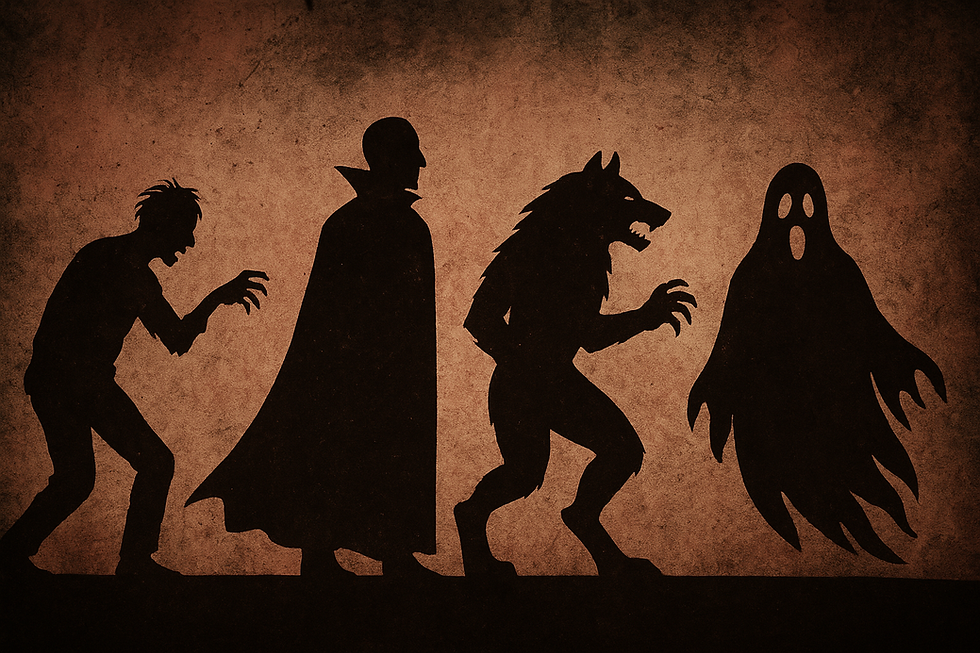Why Horror Monsters Always Mean More Than They Seem
- Bryan Alaspa
- Sep 9, 2025
- 4 min read

Horror isn’t just about jump scares. The best monsters resonate because they mirror our own struggles. They’re metaphors for what keeps us up at night, whether that’s losing control, facing death, or navigating an unpredictable world.
Symbolism in horror has been around since stories were first told around firelight. Demons warned of sin, shapeshifters revealed distrust of outsiders, and ghouls reminded us of mortality. Even now, horror monsters meaning goes beyond sharp teeth, they reflect who we are and what we fear most.
Zombies: The Collapse of Society
If you hear a moan and the shuffle of dragging feet, chances are the end of the world is near. Zombies have been a horror staple for decades, but their meaning has shifted over time.
George A. Romero’s Night of the Living Dead turned zombies into a metaphor for consumerism and societal breakdown.
In more modern takes, zombies often symbolize pandemics, climate change, or the fragility of civilization.
Zombies embody the ultimate fear: losing individuality. They’re not just mindless creatures, they’re us, stripped of identity and reduced to the hunger of the mob. That’s why psychological horror monsters like zombies resonate so strongly, they show what happens when society itself falls apart.
Vampires: Forbidden Desire and Exploitation
Elegant, seductive, and deadly—vampires are dripping with symbolism.
In classic literature, they represented forbidden sexuality and the fear of succumbing to temptation.
In modern films and shows, they often reflect themes of addiction, exploitation, and even the powerful preying on the weak.
The vampire is both alluring and terrifying, representing the dangerous pull of desire. They embody the tension between control and indulgence, making them one of the most enduring horror monsters in meaning and metaphor.
Werewolves: The Beast Within
Few creatures embody raw loss of control like the werewolf. By day, the cursed human appears normal, but by night, they become something unrecognizable.
Werewolves symbolize the fear of our own inner violence and primal instincts.
They also reflect anxieties around masculinity, rage, and transformation during times of stress.
Every full moon, the werewolf forces us to confront the terrifying idea that beneath our civilized surface lies something savage. Among psychological horror monsters, the werewolf is the ultimate metaphor for losing control of yourself.
Ghosts: The Haunting Power of the Past
Not all monsters are flesh and blood. Ghosts remind us that what’s gone is never really gone.
They symbolize unresolved trauma, grief, and guilt.
Haunted houses aren’t just spooky locations, they’re psychological landscapes where the past refuses to stay buried.
In films like The Sixth Sense or The Haunting of Hill House, ghosts aren’t simply there for scares. They’re manifestations of pain and memory, making them some of the most potent symbols in horror.
Demons: Fear of Corruption
Demons have haunted folklore for centuries, and in horror, they remain a terrifying metaphor.
They embody the fear of moral corruption, temptation, and loss of the soul.
Possession stories like The Exorcist tap into religious fears, but also the fear of losing agency over our own bodies.
Demons make us face the uncomfortable idea that evil isn’t always external...it might creep inside us and take control.
Aliens: The Fear of the Unknown (and the Outsider)
From Alien to The Thing, extraterrestrials often reflect our anxieties about invasion and the unfamiliar.
Aliens can symbolize fear of outsiders, cultural change, or even technological progress we don’t understand.
Body-snatching aliens in particular tap into paranoia, the idea that even your neighbor might not be who they seem.
Aliens are the ultimate mirror for our fear of the “other,” making them some of the most flexible and enduring monsters in horror symbolism.
Why We Love Monsters as Metaphors
So why do we keep coming back to these creatures, generation after generation? Because they make the abstract tangible. It’s easier to face our fears when they have claws, teeth, or glowing eyes.
Zombies let us explore societal collapse without actually living it.
Vampires allow us to wrestle with temptation and addiction in metaphorical form.
Werewolves give shape to our inner rage.
Ghosts whisper about our past mistakes.
Demons embody corruption and loss of control.
Aliens highlight our discomfort with the unknown.
By putting our fears into monstrous form, horror gives us a safe space to confront them—and maybe even overcome them.
Final Thoughts: Monsters Are Mirrors
Horror monsters aren’t just scary, they’re meaningful. Whether it’s zombies chewing on the collapse of society, vampires exploring forbidden desire, or ghosts dredging up past trauma, these creatures are symbols of our deepest anxieties.
The next time you watch a horror film, ask yourself: What is this monster really about? You might just find that the scariest thing on screen isn’t the creature at all, it’s the reflection of your own fears staring back at you.
My award winning horror tale The Given is out now and you should read it!
You can also view all of my books and stories in one place at my online bookstore.




Comments